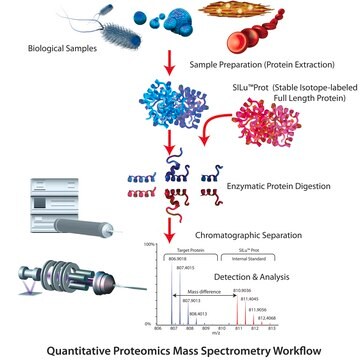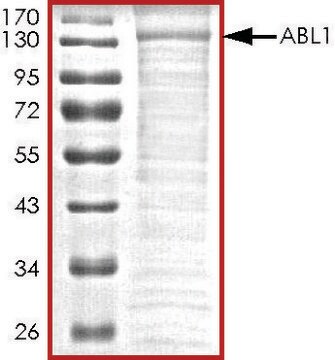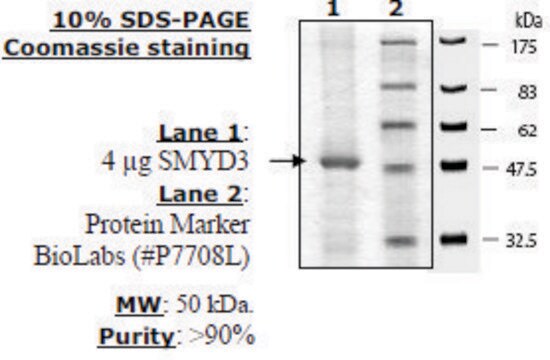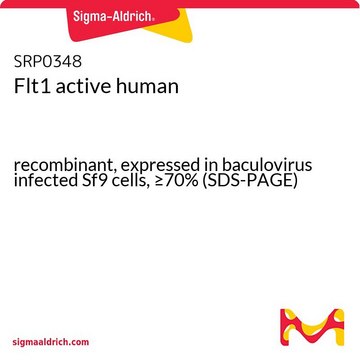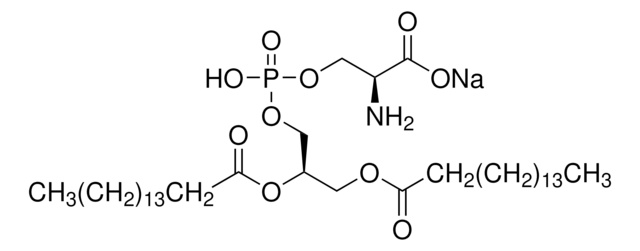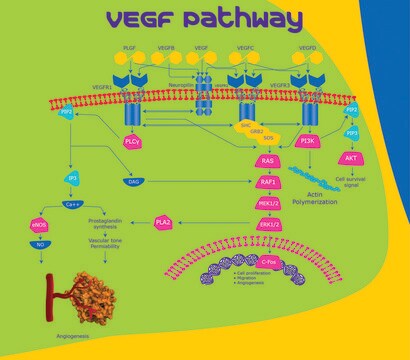PF082
VEGFR1, Human, Recombinant, S. frugiperda
Synonym(s):
Vascular Endothelial Growth Factor Receptor-1, Flt-1, EMRK2
Sign Into View Organizational & Contract Pricing
All Photos(1)
About This Item
UNSPSC Code:
12352202
NACRES:
NA.77
Recommended Products
Assay
≥90% (SDS-PAGE)
Quality Level
form
lyophilized
manufacturer/tradename
Calbiochem®
storage condition
OK to freeze
impurities
≤1 EU/μg Endotoxin (EU/μg cytokine)
shipped in
wet ice
storage temp.
−20°C
General description
Recombinant, human VEGFR-1 expressed in S. frugiperda insect cells. The disulfide linked dimeric recombinant protein contains two polypeptides of 905 amino acids long with a predicted monomeric molecular mass of ~100 kDa. As a result of glycosylation, the monomer migrates as a ~123 kDa protein in SDS-PAGE. Vascular endothelial growth factor (VEGF), also known as vascular permeability factor (VPF), is a secreted heparin binding cytokine expressed in tumor and animal cells. VEGF has been implicated in the control of angiogenesis due to its selective mitogenic stimulation of vascular endothelial cells and enhancement of vascular permeability. VEGF is a ~34-50 kDa dimer of two identical disulfide-linked subunits existing in four molecular species; 121, 165, 189, and 206 amino acid residues long, arising from alternative splicing of a single gene. VEGF binds to two receptor tyrosine kinases, Flt-1 (VEGFR1) and KDR/Flk-1 (VEGFR2) found almost exclusively on human endothelial cells. Flt-1 binds VEGF and a new VEGF-related ligand, placenta growth factor (PIGF) but KDR/Flk-1 binds only VEGF. The cDNA encoding the soluble truncated form of Flt-1 cloned from a human endothelial cell library encodes the 6 N-terminal IgG-like extracellular ligand-binding domain but does not encode the transmembrane spanning region and intracellular tyrosine kinase domains. The recombinant soluble receptor binds avidly to VEGF and is a potent VEGF antagonist. Recently, a third VEGF receptor was identified and cloned from tumor cells. This VEGF receptor is isoform-specific, binding VEGF165 but not VEGF121. Studies indicate that this VEGF receptor (VEGF165R) is identical to human neuropilin-1, a receptor for the collapsin/semaphorin family that mediates neuronal cell guidance.
Biochem/physiol Actions
EC₅₀ of 15-30 ng/ml in a cell proliferation assay using human umbilical vein endothelial cells
Warning
Toxicity: Standard Handling (A)
Physical form
Lyophilized from sterile-filtered PBS, 300 mM NaCl, 50 µg BSA/µg of cytokine.
Reconstitution
Following reconstitution, aliquot and freeze (-20°C). Stock solutions are stable for up to 3 months at -20°C.
Reconstitute to ≥10 µg/ml with sterile PBS containing ≥0.1% HSA or BSA. It is recommended that the protein be titrated for optimal results in individual systems.
Other Notes
Huang, K., et al. 2001. Int. J. Cell Biol.33, 315.
Soker, S., et al. 1998. Cell92, 735.
Kroll, J. and Waltenberger, J. 1997. J. Biol. Chem. 272, 32521.
Kendall, R.L. and Thomas, K.A. 1993. PNAS.90, 10705.
Klagsbrun, M. and Soker, S. 1993. Current Biology 3, 699.
Senger, D., et al. 1993. Cancer and Metastasis Rev.12, 303.
Brown, L., et al. 1992. Kidney International42, 1457.
Conn, G., et al. 1990. PNAS87, 1323.
Shibuya, M., et al. 1990. Oncogene5, 519.
Soker, S., et al. 1998. Cell92, 735.
Kroll, J. and Waltenberger, J. 1997. J. Biol. Chem. 272, 32521.
Kendall, R.L. and Thomas, K.A. 1993. PNAS.90, 10705.
Klagsbrun, M. and Soker, S. 1993. Current Biology 3, 699.
Senger, D., et al. 1993. Cancer and Metastasis Rev.12, 303.
Brown, L., et al. 1992. Kidney International42, 1457.
Conn, G., et al. 1990. PNAS87, 1323.
Shibuya, M., et al. 1990. Oncogene5, 519.
Legal Information
CALBIOCHEM is a registered trademark of Merck KGaA, Darmstadt, Germany
Storage Class Code
11 - Combustible Solids
WGK
WGK 1
Flash Point(F)
Not applicable
Flash Point(C)
Not applicable
Certificates of Analysis (COA)
Search for Certificates of Analysis (COA) by entering the products Lot/Batch Number. Lot and Batch Numbers can be found on a product’s label following the words ‘Lot’ or ‘Batch’.
Already Own This Product?
Find documentation for the products that you have recently purchased in the Document Library.
Our team of scientists has experience in all areas of research including Life Science, Material Science, Chemical Synthesis, Chromatography, Analytical and many others.
Contact Technical Service
